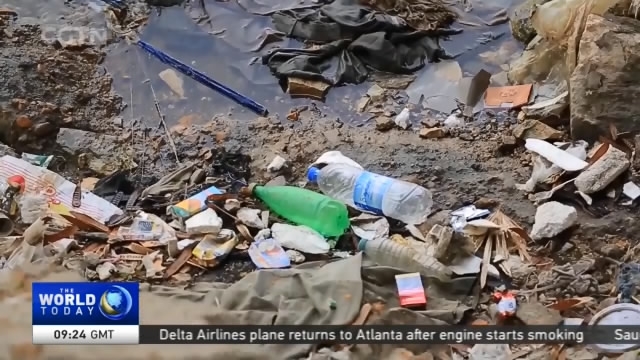
19:43, 19-Apr-2018
Earth Day 2018: Egypt endeavors to reduce plastic waste along Nile river
03:20

As we continue our series on plastic waste, related to this year's Earth Day, with a look at Egypt. The North African country is home to the longest river in the world -- the Nile. Yasser Hakim tells us about efforts taken to reduce the effects of plastic waste on the river and across the country.
The river Nile is a source of 95% of Egypt's drinking water. It's the source of life for Egyptians. But it's also the recipient of waste, including the most damaging, plastic waste.
PROF. SAYED HASSAN MANAGER, ENVIRONMENTAL AFFAIRS AGENCY "Egypt produces 16 million tonnes of rubbish per year. 6-10% is in the form of plastic material. Some has been collected and buried in land fields. The problem of plastic is enormous. In Egypt, about 55% of plastic collected are recycled. The rest are thrown into the rivers or streets."
Two-thirds of the one hundred million population are living on the Nile banks. This makes it hard to contain the pollution. The government applied strict laws and punishments for environmental violations on the Nile. But it has also worked on plans to encourage reducing solid waste.
PROF. SAYED HASSAN MANAGER, ENVIRONMENTAL AFFAIRS AGENCY "The ministry of Environment, they have now developed many other places as land fields to bury pollutants. The other thing, they have a program called TRASH TO CASH. You hand over the plastic material and take money. The government pays 350 Egyptian pounds per ton. They are also developing factories either for recycling or to use trash for energy and other material such as fertilizers."
YASSER HAKIM CAIRO "Aside from government efforts to clean up the river Nile, the civil society has also been active to protect the Nile from plastic waste and make maximum use out of it."
One such organisation is the Ein Al Bee'a or Eye on the Environment Group. They gather plastic waste from the river for recycling.
MOHAMED LOTFY MANAGER, EYE ON ENVIRONMENT GROUP "Plastic is one of the solid wastes we recycle after gathering it from the river or anywhere else. The plastic bottles, or soft drink bottles and cans, are the most common types of solid waste we find. We have the assembly line here, where we break the plastic and wash it, to be transported to factories such as fiber glass firms."
Finally, there's a major media campaign expected at the end of the year to create awareness about waste and pollution. Yasser Hakim, CGTN, Cairo.

SITEMAP
Copyright © 2018 CGTN. Beijing ICP prepared NO.16065310-3
Copyright © 2018 CGTN. Beijing ICP prepared NO.16065310-3